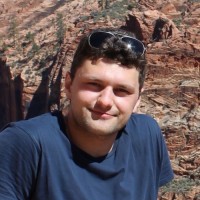Edinburgh student wins Institute of Physics prize for UK's best Computational Physics PhD.

Edinburgh student Ioan-Bogdan Magdau has been awarded first place in the IoP Computational Physics Group Thesis Prize. The prestigious award is open to all UK PhD students graduating from the UK and Ireland between January 2016 and April 2017. Working with Prof. Graeme Ackland, Ioan developed a raft of codes and methods to relate quantum mechanical calculations in solid hydrogen to experimental measurements.
Although the hydrogen atom is easy to understand theoretically, when pressurized into liquid or solid state it becomes complicated. In nature, this type of matter forms the core of large planets like Jupiter and Saturn, being responsible for the planets’ large magnetic fields.
The complicated quantum mechanics of hydrogen has made it a playground for theorists, who predicted it may be a metallic, superconducting, superfluid. In the past few years, very limited experimental data from minute samples of solid hydrogen have been measured. Ignoring the “calculate what's easy to calculate'” and “look at my pretty theory” approaches to science, Ioan reverted to the classic scientific method. He tackled head on the problem of devising calculations which made predictions testable by the limited data available. Ioan's approach was characterised by always wanting to understand “What's really going on”, echoing the famous James-Clerk Maxwell's “What's the go o' that”.
Ioan's key results, confirmed in experiment, showed that high pressure warm solid hydrogen has a high symmetry, dynamic structure with half the molecules spinning and half wobbling. He also devised new methods to study isotopic mixtures of hydrogen-deuterium, showing that their spectra contain a wealth of data absent in pure hydrogen, and a far more stringent test for theory. Post-graduation, Ioan has moved to California, and taken a position at Caltech.
I am honoured to receive the recognition of the Computational Physics Group within the Institute of Physics. This award speaks not only to my hard work but also to the dedication of my advisor, Prof. Graeme Ackland and to the excellence of research conducted at the University of Edinburgh. Ioan-Bogdan Magdău

